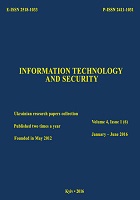Perspective directions of scientific research in the area of technical exploitation of systems and means of special communication
DOI:
https://doi.org/10.20535/2411-1031.2017.5.1.120590Keywords:
Special communication device, special communication system, efficiency of special communication systems, diagnostic support, metrological support.Abstract
A comprehensive analysis of the state and trends has been carried out for the development of various special communication systems. There is established regularities of using certain special means of communication in certain case. The directions of scientific researches aimed at elimination of established antagonisms are determined in order to increase the efficiency of use during the technical operation of systems and means of special communication by appointment. The absence of a general approach to the definition of a comprehensive assessment of the quality of the functioning of special communication systems have been showed, as a whole, as well as individual means of special communication, and a comprehensive comparison with known analogues of foreign production also. The absence of models and methods in explicit form, which can help to quantify the technical and economic indicators of the systems, objects and processes in the State system of government communication with the given accuracy, to measure the absolute values of the parameters and comparison them with the corresponding indicators of others objects with using of relative indicators. The article defines the insufficiency of research in the theory of the reliability analysis of technical systems with variable structure and the development of modular hardware technical support and measuring equipment for maintenance and repair of software-controlled communication facilities. The substantiated specialization and number of workplace of field repair bodies is achieved on the basis of the decision of the list of specialized tasks.
References
L. Sakovych, and V. Ryzhakov, “The improvement directions of communication technical support”, Zviazok, no. 2, pp. 64-65, 2001.
V. Ryzhakov, “Perspective directions of research of the improvement of the system of technical support of military communication equipment”, Research papers collection KVIUZ, no. 1, pp. 136-139, 2001.
Y. Semyrich, “Status and prospects for the development of the communication and automatization system of the Armed Forces of Ukraine and the communications troops for the period up to 2010”, Informational digest on communication and automatization, no. 3, pp. 123, 2002.
V. Yerokhin, and V. Raievskyi, “Forecasting of the main characteristics of perspective radio stations of power structures ”, Zviazok, no. 3, pp. 61-64, 2005.
A. Chekmarev, Qualimetry and quality management. Part 1. Qualimetry, Samara, Russian Federation: Samara State Aerospace University publishing house, 2010.
T. Pasko, Assessment of technical systems quality. Tahanrog, Russian Federation: TGTU, 2014.
S.Y. Hnatiuk, “Methods and models for estimating and ensuring availability of information security software in the government communication system”, dissertation candidate of technical sciences, National Аviation University, Kyiv, Ukraine, 2016.
E. Zaitseva, “Research of the reliability of information systems”, Electrosvyaz Magazine, no. 6, pp. 37-39, 2003.
V. Ryzhakov, and L. Sakovych, “Quantitative assessment of the structural reliability of communication systems”, Zviazok, no. 4, pp. 53-57, 2004.
A. Polovko, and S Gurov, Based on reliability theory. St. Petersburg, Russian Federation: BKHV-Petersburg, 2006.
O. Romanov et al., “Assessment of the affect of configuration and structure of communication directions on the survivability of telecommunication networks”, Collection of scientific papers of Military Institute of Telecommunications and Informatization, no. 1, pp. 142-150, 2005.
A. Kharybin, and O. Odarushchenko, “On the approach to solving the problem of selecting a methodology for evaluating the structural reliability and survivability of critical information systems”, Radio electronic and computer systems, no. 6 (18), pp. 61-70, 2006.
V. Kononenko, “Reliability and survivability of communication and alert systems”, Civil security technology, vol. 5, no. 4, pp. 81-96, 2008.
S. Hnatiuk, та L. Sakovych, “Quantitative evaluation of the reliability indicators of communication systems”, Zviazok, no. 6, pp. 10-15, 2013.
L. Komarova, and O. Kilmeninov, “Reliability of the complex system in the informational aspect”, Zviazok, no. 3, pp. 3-6, 2014.
L. Bondar, and L. Sakovych, “ The service life of modern mobile radio systems”, Zviazok, no. 1, pp. 33-35, 1999.
S.P. Ksenz et al. Fighting diagnostic errors during maintenance and repair of communication and navigation systems. St. Petersburg, Russian Federation: VAS, 2010.
Ryzhov E.V. Complex Methodology for the substantiation of requirements for the metrological support of Military Communication Technics on the basis of Technical Diagnostics Methods, dissertation candidate of technical sciences, National Academy of the Land Forces of Hetman Petr Sagaydachny, Lviv, Ukraine, 2016.
Order of the Minister of Defense of Ukraine dated December 15, 2006 No. 731 “Regulations on the metrological support for the Ministry of Defense of Ukraine and the Armed Forces of Ukraine ”. – 8 p.
Downloads
Published
How to Cite
Issue
Section
License
Copyright (c) 2020 Collection "Information technology and security"

This work is licensed under a Creative Commons Attribution 4.0 International License.
The authors that are published in this collection, agree to the following terms:
- The authors reserve the right to authorship of their work and pass the collection right of first publication this work is licensed under the Creative Commons Attribution License, which allows others to freely distribute the published work with the obligatory reference to the authors of the original work and the first publication of the work in this collection.
- The authors have the right to conclude an agreement on exclusive distribution of the work in the form in which it was published this anthology (for example, to place the work in a digital repository institution or to publish in the structure of the monograph), provided that references to the first publication of the work in this collection.
- Policy of the journal allows and encourages the placement of authors on the Internet (for example, in storage facilities or on personal web sites) the manuscript of the work, prior to the submission of the manuscript to the editor, and during its editorial processing, as it contributes to productive scientific discussion and positive effect on the efficiency and dynamics of citations of published work (see The Effect of Open Access).

